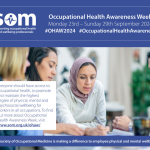Introduction:
As we celebrate Men’s Health Week 2023, it is crucial to shed light on the significance of addressing men’s health concerns in the workplace.
In the fast-paced world we live in, it is easy to overlook the importance of self-care and preventative measures. However, taking care of the physical and mental well-being of male employees not only benefits them individually but also contributes to a healthier and more productive workforce.
In this blog post, we will explore the key aspects of men’s health and how employers can support their male workforce in achieving optimal health and well-being.
Understanding the Challenges:
Men face unique health challenges that often go unnoticed or unaddressed due to societal expectations and stigmas. These challenges include mental health issues, cardiovascular diseases, workplace injuries, and the need for regular health screenings.
To create a culture of wellness, employers and HR managers must recognise these challenges and proactively promote preventive measures and access to appropriate healthcare services.
Promoting Mental Well-being:
Mental health plays a significant role in overall well-being, and it is crucial for organisations to prioritise mental wellness initiatives for their male employees. Employers can foster an environment that encourages open conversations about mental health and supports employees in seeking professional help when needed. Offering employee assistance programs, mental health resources, and regular stress management workshops are valuable steps towards promoting mental well-being.
Encouraging Physical Activity:
Regular physical activity is not only vital for physical health but also has a positive impact on mental well-being. Encouraging male employees to engage in physical activities can be as simple as organising lunchtime walking clubs, providing gym memberships or fitness classes, or promoting active commuting options such as cycling or walking.
A physically active workforce is more likely to experience increased productivity, reduced absenteeism, and improved morale.

Workplace Safety:
Promoting workplace safety is a key aspect of occupational health and plays a vital role in men’s overall well-being. Employers must prioritise creating safe working environments, conducting regular risk assessments, and providing necessary training on safety protocols. By ensuring adequate safety measures and addressing potential hazards, organisations can significantly reduce the risk of workplace accidents and injuries.
Regular Health Screenings:
Preventive healthcare is paramount for early detection and effective management of health conditions. Employers can collaborate with occupational health providers, such as Clarity, to organise regular health screenings tailored specifically for men.
These screenings can include tests for blood pressure, cholesterol levels and other relevant measures. By offering such screenings, employers demonstrate their commitment to the well-being of their male workforce and provide an opportunity for early intervention.
Flexible Working Arrangements:
Incorporating flexible working arrangements can have a positive impact on men’s health and work-life balance.
Flexible schedules, remote work options, and support for parental leave can help reduce stress, improve mental well-being, and enhance overall job satisfaction. Offering such flexibility demonstrates a progressive approach towards addressing the specific needs of male employees and fosters a culture of work-life balance.
Men’s health should not be an afterthought in the workplace. By proactively addressing the unique challenges faced by male employees, organisations can cultivate a healthier and more productive workforce.
Promoting mental well-being, encouraging physical activity, ensuring workplace safety, organising regular health screenings, and offering flexible working arrangements are essential steps towards prioritising men’s health.
By investing in the well-being of their male workforce, employers and HR managers demonstrate their commitment to creating a thriving workplace where individuals can flourish both personally and professionally.
Remember, taking care of men’s health is not just a responsibility; it’s an investment in the success of your organisation.
Let’s make Men’s Health Week 2023 the catalyst for positive change in workplace health and well-being.







